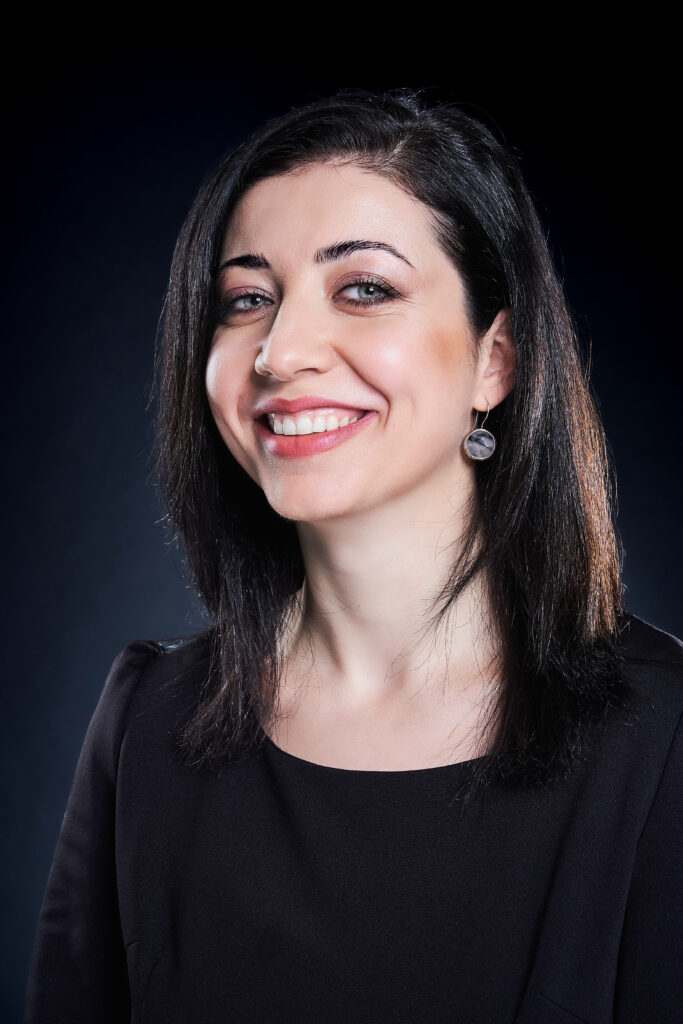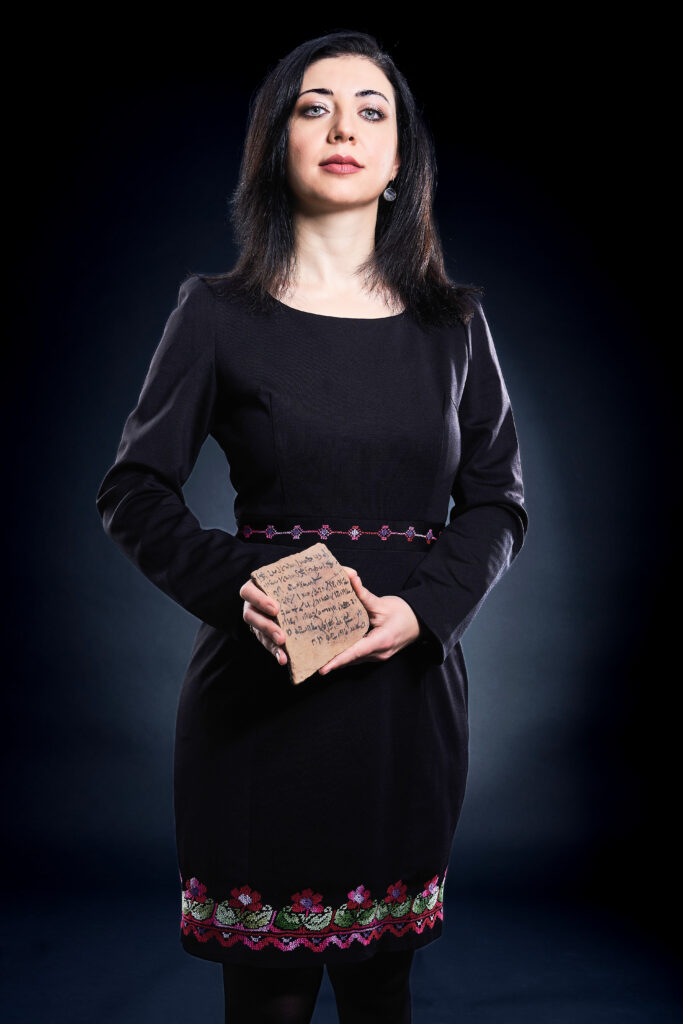“Architecture changes how you feel” – Diana Miznazi in Portrait

To Syrian architect and conservator Diana Miznazi, knowledge is power. She sees herself as a representative of migrant women working in science. Diana is proud and grateful for what she has come to achieve as one of them, “It is a great responsibility to have, so I try not to think about it all the time”, she laughs. She is a PhD student and a researcher at the Department for Byzantine Archaeology of the University of Freiburg. From an office with large windows, overviewing the old city, she coordinates the wonderfully titled project MARBLE (Mixed and Augmented Reality in Blended Learning Environments). “Archaeology is, in its essence, a 3D field”, she explains, “but we study them [objects, buildings] on a 2D screen or in a book.”
The project uses mixed and augmented reality to bypass this limitation, by allowing students to explore the spatial complexity of archaeological sites interactively. The focus of this effort is a didactic one, which she deeply enjoys. Being in a university is ideal for Miznazi as she says, “I love being around people who learn. Especially in higher education, people don’t have to be there, but they still choose to study things that are very specific and I find that fascinating.”
The technical aspect of project MARBLE was a challenge, but the trained architect is no stranger to obstacles. A native of Aleppo and an immigrant who has lived in different parts of the Middle East and now in Europe, she has had to overcome greater hurdles and to adopt to new ways of doing and learning things. The five years of architecture studies in her hometown meant many nights spent in the university working on projects. In order to develop hand-drawing skills, it was thought pedagogically helpful to introduce digital submissions only in the third year. She was in the early months of her first master’s program, in 2011, when the Syrian Revolution began. In 2013, towards the end of her Master studies, the security situation had drastically deteriorated. Electricity, water and internet were only available for two to three hours every day; the sound of bombings was a constant background noise in her daily life. However, Diana was determined to graduate. “I don’t like to leave things hanging”, she mentions with a lighthearted smile. This determination led her to a second master’s program in conservation studies, located in Doha, the capital city of Qatar. After graduation, she served as a cultural officer for UNESCO in Doha, documenting the damage inflicted by bombings to the World Heritage Site of the Old City of Sana’a, the capital of Yemen. She then joined the German Archaeological Institute in Istanbul for four years until coming to Germany in 2020.
Miznazi developed a new perspective on learning during her second course of master’s studies. This program, organized by University College London (UCL) Qatar, aimed to draw upon renowned academic expertise, with a focus on the Gulf and Middle East region. “They told me I had a lot of knowledge, but that I had to work on my critical thinking”, she recalls. Studying architecture in Aleppo years earlier, “nobody asked our opinion about what we were taught”, she says. She explains that the prevailing mindset was a very conservative and hierarchical one. At UCL, Diana found the abundance of materials she was able to access to be almost overwhelming, whereas in Aleppo students had to always deal with a scarcity of sources. Sometimes, only one book was available in the library for a given subject, and waiting times were long. In her view, there is a bright side to having had to defy these odds: she developed a great capacity to dig up knowledge she needs and to find solutions. By contrast, studying in Germany seems almost a “pampered” experience to her, although she has great respect for the contrary task of navigating a deluge of information.
Alongside the passion for her work looms the concern, that she is not spending enough time with her son, who attends kindergarten in Freiburg. “‘You cannot decide for me!’, this I have never told my mother,” she says laughingly. Miznazi is happy that her little boy did tell her such a thing and that his education emphasizes critical thinking skills and a sense of independence from a young age. Her own schooling days as a child were rather exceptional too. Both her parents were highly trained engineers. Her mother, in particular, put a lot of stress on learning, good grades and being able to support oneself. “Getting married and being supported by a man was never my plan and I never took it seriously,” she says. A few years later, at the German Archaeological Institute in Istanbul, she coordinated the Stewards of Cultural Heritage project. One of the individual research projects of the participating fellows was especially dear to her: a picture book titled The Magic Words teaches about the ancient Eblaite language as a part of Syrian cultural ancestry. “In Syria, when I was small, picture books for children were scarce” she explains.
By Miznazi’s own account, it is rare for a woman in Syria not to be affected by some form of discrimination. For example, parental skepticism about co-education in higher education holds back many girls in Syria. Luckily, that was never a problem for her. She considers herself very privileged in this regard, mostly thanks to her family’s support. The architect’s modesty becomes evident in when she discusses her own privilege. When she was sexually harassed in a former workplace, she immediately quit the position. “I was very lucky because I could afford to do so and not starve,” she says. At another occasion, when she was coordinating a team, male workers were reluctant to receive instructions from “a lady” and refused to comply. Candidly, she says they managed to cooperate in the end, at least for a little while.

Most often, she was a witness to misogyny affecting other women, although she may not have called it that at the time – especially as a child and adolescent. She concentrated on her work and did not have the mental space to process such episodes. Her advice to women is to never become discouraged, but persevere, and to raise awareness of the issues they face. Since living in Germany, she has not encountered that kind discrimination because of her gender. Yet navigating the limitations and biases, based in being a migrant, manifests in the complexity of bureaucracy and trying to prove herself in the German academic and non-academic community, where she is not a fluent speaker of the language. Now, the greatest amount of stress comes from the brief duration of her residence permit.
Miznazi’s fascination with buildings started early, and it is greater than any prejudices she has had to face or the instability of living as a migrant. She remembers how „there weren’t many parks or forests“ when she was growing up in Aleppo, and so she took to exploring the streets of the old city. Traditional courtyard houses, with their central fountains, made her realize that “architecture changes how you feel” and she wanted to dedicate her life to that. Later, when local landmarks had been reduced to rubble by the bombings, but a swift end to the conflict still seemed plausible, she decided to specialize in conservation and restoration. Knowledge, at the time, changed its meaning from something instrumental, which could advance one’s place in society, to something that could serve her community. More than a decade later, the war still smolders, and the meaning of knowledge has changed yet again. It has become a manifestation of resilience and defiance.
Portrait by Ani Diaconu
Ana Diaconu is a master’s student in Neuroscience at the University of Freiburg. Her interests are interdisciplinary, varying from the effects of pesticides on pollinators to belief formation in humans and science communication. She spends her free time going down curious rabbit holes, learning to make art and enjoying nature.